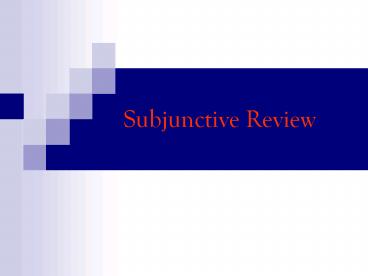Subjunctive Review - PowerPoint PPT Presentation
1 / 20
Title:
Subjunctive Review
Description:
Subjunctive Review The subjunctive mood is used in complex sentences to express hypothetical situations (things that may or may not be real or factual) or situations ... – PowerPoint PPT presentation
Number of Views:176
Avg rating:3.0/5.0
Title: Subjunctive Review
1
Subjunctive Review
2
- The subjunctive mood is used in complex sentences
to express hypothetical situations (things that
may or may not be real or factual) or situations
toward which the speaker is expressing feelings
or attitude.
3
SUBJUNCTIVE IN NOUN CLAUSES
- The independent clause (or main clause) stands
alone and expresses a complete idea. - The dependent clause (or subordinate clause)
cannot stand alone and depends on the main clause
to complete its message.
4
Ejemplos
- Recomiendo que sigas una dieta saludable.
Independent clause Subject yo Verb expressing
desire in the indicative mood
Dependent clause Subject tú Verb in the
subjunctive mood
(I recommend that you follow a balanced diet.)
5
- No es bueno que esta comida tenga mucha grasa.
Independent clause Subject (it)
impersonal Impersonal expression indicating
opinion in the indicative mood
Dependent clause Subject la comida Verb in the
subjunctive mood
(It is not good that the food has a lot of
grease.)
6
- Espero que no tengamos tarea el fin de semana.
Independent clause Subject yo Verb expressing
wish in the indicative mood
Dependent clause Subject nosotros Verb in the
subjunctive mood
(I hope that we dont have homework on the
weekend.)
7
When NOT to use the Subjunctive Part 1
8
- If the verb or expression in the independent
(main) clause does not express wish, preference,
recommendation, opinion, etc. - THEN
- The verb in the dependent clause must also use
the indicative mood.
9
- Yo sé que tenemos que hacer ejercicios.
Independent clause Verb that expresses certainty
(fact) in the indicative mood
Dependent clause Verb in the indicative mood
(I know that we have to exercise.)
- Es obvio que ella sigue una dieta saludable
Independent clause Impersonal expression of
certainty in the indicative mood
Dependent clause Verb in the indicative mood
(It is obvious that she follows a healthy diet.)
10
What happens if?
- If the subject in the independent (main) clause
is the same as in the dependent clause. - THEN
- The dependent clause must take the infinitive of
the verb. - And the word que is no longer used in the
sentence to connect the two clauses.
11
- Espero sacar buenas notas en los exámenes.
Independent clause Subject yo Verb in the
indicative
Dependent clause Subject (yo) Verb in the
infinitive
(I hope that I get good grades on the exams.) (I
hope to get good grades on the exams.)
12
- Uds. quieren ser saludables.
Independent clause Subject Uds. Verb in the
indicative mood
Dependent clause Subject (Uds.) Verb in the
infinitive
(You want to be healthy)
(You want yourselves to be healthy.)
13
When NOT to use the Subjunctive Part 2
14
The subjunctive doesnt like my C.A.T.!
- Certainty / Knowledge
- Affirmation
- Truth
15
- Some other verbs and expressions that normally
take the indicative in subordinate clauses (the
sentence after the que) include - Certainty / Knowlege Estar seguro, Es cierto (to
be certain / sure) saber (to know). - Affirmation creer (to believe for a FACT),
pensar (to think for a FACT). declarar (to
declare). - Truth Es verdad (to be the truth)
16
- Sé que Elena habla español.
- I know that Elena speaks Spanish.
- Knowlege Indicative
- Es verdad que yo lo hice.
- It's true that I did it.
- Truth Indicative
- Creo que están en casa.
- I think they're at home.
- Affirmation or belief (for a fact) Indicative
17
Repaso
18
The subjunctive doesnt like my C.A.T.!
- Certainty / Knowledge
- Affirmation
- Truth
19
When NOT to use the Subjunctive
- We DO NOT use subjunctive to express facts,
beliefs, truth, certainties or the obvious. - Creo que... I believe/think (FOR A FACT) that...
- Creo que tengo buenas notas
- No hay duda que... There is no doubt that...
- No hay duda que hablo español
- Es obvio/ cierto/ verdad/ un hecho que....It's
obvious, certain, true, a fact that... - Es cierto que tengo 16 años.
- Yo sé que...(tú sabes que...)I know (FOR A FACT)
or You know (FOR A FACT) that.. - Yo sé que soy muy buena amiga.
20
When NOT to use the Subjunctive
- We also do not use the subjunctive when
discussing people or things we know exist - Hay una secretaria que habla español.
- There is a secretary who can speak Spanish.
- Busco al hombre que tiene la llave.
- I'm looking for the guy who has the key. I know
there is such a guy-he exists.































